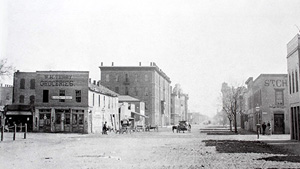From Proud Heritage, Volume I by DCPA, currently out of print.
Samuel Peterman was born in Toronto, Canada in 1846. He came to Dallas in 1875, where he resided until his death in 1920.
April 10, 1878 he married Mary Nussbaumer, daughter of La Reunion settlers Dorothea Boll and Jacob Nussbaumer. Write-up of the Peterman wedding which appeared in the Dallas newspaper follows:
“Yesterday morning at 5 o’clock Mr. Sam Peterman, of the stock firm of Wilson &. Peterman, was married to Miss Mary Nussbaumer, leaving on the train immediately for a. bridal tour through the North and Canada. Mr. Peterman is one of our wealthiest and most enterprising cattle men; doing a heavy business every year, while the fair bride is the daughter of one of Dallas’ solidest citizens, a gentlemen respected and honored for his probity and worth. We wish the groom and bride bon voyage, not only on their honey moon trip, but all along adown the stream of life, which stream we hope may meander through grooves of felicity, and flowery meads of joy and happiness.”
They had four children: Lida Peterman Carnes, George Nussbaumer Peterman, Howard Adolph Peterman and Theodore Ervin Peterman.
On April 4, 1882, Samuel was naturalized as an American citizen. Until then he was a native of Canada and a subject of the Queen of England.
He had many business interests, among which were cattle raising and ranching. He owned the largest cotton gin at that time. It was known as Continental Gin. [Note: Possibly instead known as Dallas Car and Agricultural Implement Company, chartered by the State of Texas in 1882. Samuel Peterson was an incorporator and served as treasurer.]
In the building of the city of Dallas, Sam Peterman, along with many citizens, offered land grants to various outside enterprises to move their business houses to Dallas.
Sam Peterman was an Alderman of the 6th Ward for several years beginning in April 1886. At that time John Henry Brown was Mayor. Records were found in the cornerstone when tearing down Turner Hall (where Masonic Temple is now). These records are now in the Dallas Historical Society’s Museum in the Hall of State at Fair Park.
He took a very active part in politics. After retirement he would spend time at the Court House, making himself available for jury duty if needed.
At different times he owned large farms in and around Dallas; one was where old Hockaday School was located at Belmont and Greenville. One farm was near old City Park, another was in the neighborhood of Caruth Farms near Northwest Highway and Central Expressway. He also owned farms on Garland Road near White Rock Lake.
Many funny stories and happenings come to mind when some of the grandchildren get together and discuss what they remember about Grandpa.
One grandson, DeWitt Carnes, remembers Grandpa going by in the surrey to pick up the Carnes children to take them to school. DeWitt begged off from going to school because he was so sick (school was not his favorite place to go!) Grandpa took the others to school and returned to help DeWitt’s Mom “cure” him. Just the sight of a cup of castor oil seemed to do the trick. He agreed he was feeling fine, so he was off to school.
A granddaughter, Lorraine Peterman Barker, remembers hearing the story that Grandpa used to drive his horse and buggy on the tracks of the trolley cars. He refused to move over and said “he was there first”, so the trolley car would knock his buggy out of the way. Many times Grandmother received a call to “come get Sam, that he’d gotten his wagon damaged again.” And, to show the value of property, my father (Howard) said Grandpa traded the corner where Sanger Bros. (now El Centro) is for a horse saddle.
Another granddaughter, Ruth Carnes, says she remembers Grandpa as a handsome, gray haired old gentleman who loved his family, his fellowman and especially his 12 grandchildren. He was a fine man and a substantial citizen. She wishes she could apologize to him for referring to him as “old.” He died at 74; … she is in her late seventies and does not wish to be referred to as “old!”
By Lorraine Peterman Barker, DeWitt W. Carnes and Ruth Carnes


